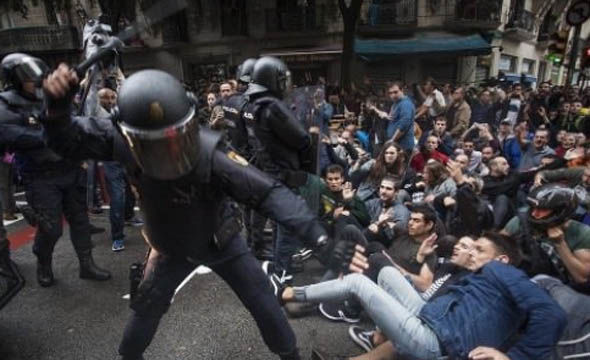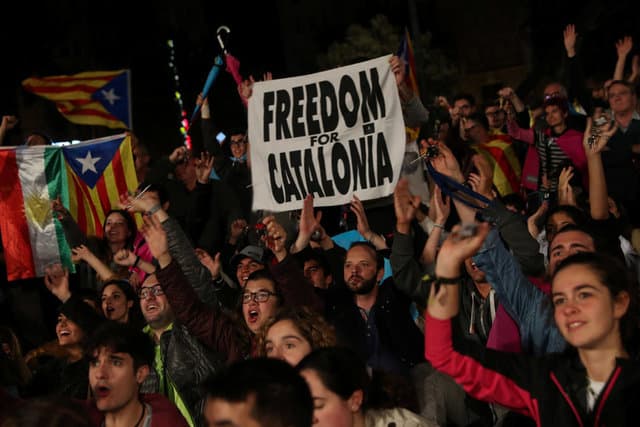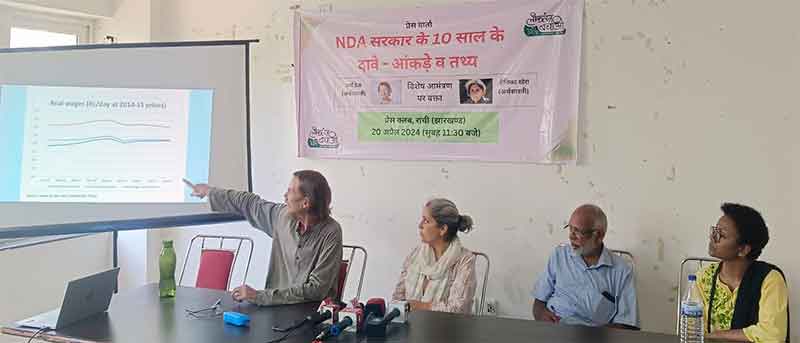
Over the weekend, the Spanish government moved to assert direct rule over Catalonia. This followed Madrid’s announcement on Friday that it would apply Article 155 of the Spanish Constitution to seize Catalonia, dissolve its parliament and hold new elections. With Catalan nationalist officials in Barcelona announcing plans to defy Madrid after declaring independence on Friday, a crackdown by the Spanish security forces in Catalonia is looming.
A government notice was issued officially deposing Catalan regional Premier Carles Puigdemont and his deputy Oriol Junqueras, along with all 12 members of the Catalan cabinet. In their place, Spain’s deputy Prime Minister, Soraya Sáenz de Santamaría, will become the unelected head of Catalonia. Spain’s ministries will seek to seize control of their Catalan counterparts.
In a move to secure control of the Catalan police, Madrid sacked the director general of the Catalan police, Pere Soler. Soon after, Spanish Interior Minister Juan Ignacio Zoido ordered the removal of the chief of the regional Mossos d’Esquadra police, Josep Lluís Trapero, who is considered too close to the separatists. Trapero is also being prosecuted on sedition charges for having allowed the October 1 Catalan independence referendum to go ahead. Trapero issued a statement saying he would comply with his removal.
Madrid is also purging hundreds of Catalan civil servants. Since Friday, the Catalan delegations in France, the United Kingdom, Germany, the United States, Canada, Mexico, Austria, Italy, Portugal and Denmark have been sacked. Hundreds more are expected to be fired this week.
The Popular Party (PP) government of Prime Minister Mariano Rajoy is threatening all 200,000 Catalan civil servants with sacking if they oppose its attempt to seize control of the region. Rajoy has announced plans to discipline workers “without recourse to previous mechanisms regarding disciplinary measures.”
On Sunday, there was a mass protest of 300,000 in the streets of Barcelona in defense of Spanish unity. The rally was called by the antisecessionist right-wing group Societat Civil Catalana and supported by the pro-Article 155 parties: Citizens, the PP and the Socialist Party in Catalonia. Another pro-unity protest this month drew similar numbers. It included forces from working-class districts in the suburbs of Barcelona hostile to secession.
Thousands also demonstrated in neighboring Valencia against fascism and the attacks on October 9, when a peaceful demonstration in solidarity with the Catalans was assaulted by fascists.
The Spanish trade unions, while hostile to mobilizing the working class against the threat of a crackdown, are warning the political establishment of broad opposition among workers to Madrid’s threat of military intervention in Catalonia.
Marc Casanova of the IAC trade union said that “we will not recognize the violation of the Catalan institutions’ self-government… our union will not recognize the legitimacy of these authorities.” The spokesperson of the teachers union USTEC, Ramon Font, said that many teachers would not comply if Madrid attempted to change the Catalan education system.
Resistance is also expected from the firemen, who have opposed Madrid’s police measures since the October 1 referendum, when many, dressed in their uniforms, intervened to protect the ballots. One fireman told AFP, “If [pro-independence protesters] block a road and they [the Spanish authorities] ask us to unblock it, maybe we will not respond.”
On the judicial front, Madrid is preparing repression against the Catalan separatist movement on a scale not seen since the 1939-1978 fascist dictatorship set up by General Francisco Franco. Today, the Attorney General’s Office is expected to charge Puigdemont, members of the Catalan government and the parliamentary committee that authorized the vote on independence, including parliamentary spokesperson Carme Forcadell, with rebellion, a crime punishable by up to 30 years in prison. Other charges will include disobedience, prevarication and embezzlement.
The office is charging “all of those who have participated in the events”—a term vague enough to allow the prosecution of thousands of people and anyone who opposes Article 155. The Attorney General’s Office also said that it would charge not only those directly responsible, but also all “cooperators.”
Amid a looming threat of dictatorship in Spain, with the European Union backing Madrid, the only force that can offer a progressive solution to the crisis is the working class. The critical question is the mobilization of the working class, in Catalonia and the rest of Spain and across Europe, on the basis of a socialist and internationalist perspective against the threat of police and military repression by Madrid.
Any struggle requires determined opposition to the Catalan bourgeois nationalists as well as the political establishment in Madrid. The Catalan nationalist parties are bitterly hostile to a political intervention in the crisis by the working class.
The Catalan secessionists are ruling out any serious opposition to Madrid’s plans for a crackdown. Having for years run pro-austerity regimes in Barcelona, they are deeply hostile to any appeal to opposition in the working class. Instead, in a three-minute video issued on Saturday, Puigdemont called for “democratic opposition” to Madrid’s intervention. “We must do so resisting repression and threats, without ever abandoning, at any time, civic and peaceful conduct,” he declared.
The following day, the vice-premier and leader of the Republican Left of Catalonia, Oriol Junqueras, wrote a piece in the pro-secessionist daily El Punt Avui saying, “We cannot recognize the coup d’état against Catalunya, nor the antidemocratic decisions that are being adopted by the PP, remote-controlled by Madrid.” Junqueras added that “in the following days we will have to take decisions and not always easy to understand.” He called for a “shared strategy” and “a civil and peaceful attitude.”
Such comments show that the secessionists, driven by the bankrupt perspective of forming a new independent capitalist state in Catalonia, have no strategy for confronting the crackdown. They fear, above all, an independent intervention by the working class via strikes, workplace committees and appeals to workers internationally for support. Fearing the working class, they do not want to tap into deep-rooted popular opposition to Madrid’s return to authoritarian forms of rule.
They would prefer Spanish military occupation and possible foreign exile to the outbreak of mass workers’ struggles against repression by the bourgeois state machine, which they aspire to control.
The December 21 snap elections in Catalonia that Madrid is demanding are entirely antidemocratic, held under the threat of Spanish military intervention and with hundreds of Catalan politicians expected to be in jail. The only result Spanish Prime Minister Rajoy will tolerate is the election of an explicitly antisecessionist regional government.
Nevertheless, Puigdemont’s PDeCAT (Democratic European Party of Catalonia), Junqueras’s ERC (Republican Left of Catalonia) and the pseudo-left CUP (Popular Unity Candidacies) have not come out against these fraudulent elections. Former Premier Artur Mas defended the PDeCAT’s participation in the elections, saying that it would be “lethal” to leave the secessionist forces outside the parliament.
The Catalan crisis is also exposing the political bankruptcy of the Podemos party. Factional divisions are erupting inside the party, but they are over whether to orient to the Spanish state or the Catalan secessionists. On Friday, Podemos leader Pablo Iglesias approved Rajoy’s reactionary measures, saying that elections “should takes place without repression and with all the political options available.”
The Podemos leader in Catalonia, Albano Dante, implicitly criticized Iglesias on Catalunya Ràdio, saying that accepting these elections means “to accept [Article] 155,” which is an “immense contradiction.” He also did not discard a coalition of Podemos Catalonia with the PDeCAT, ERC and CUP.
The Pabloite Anticapitalistas wing of Podemos posted a statement recognizing the “new Catalan Republic” and calling for rejection of Article 155. It promoted the “democratic, peaceful and disobedient defense of the will of the Catalan people and their right to decide.”
While Iglesias orients to Rajoy to defend the Spanish nation-state, the Pabloites and the Catalan wing of Podemos are promoting Catalan nationalism. All these factions are united in aiming to suppress rising social opposition to Madrid and the threat of military rule.
Originally published in WSWS.org
















































